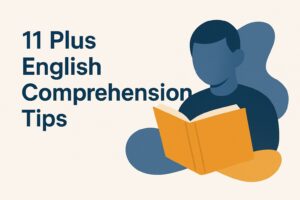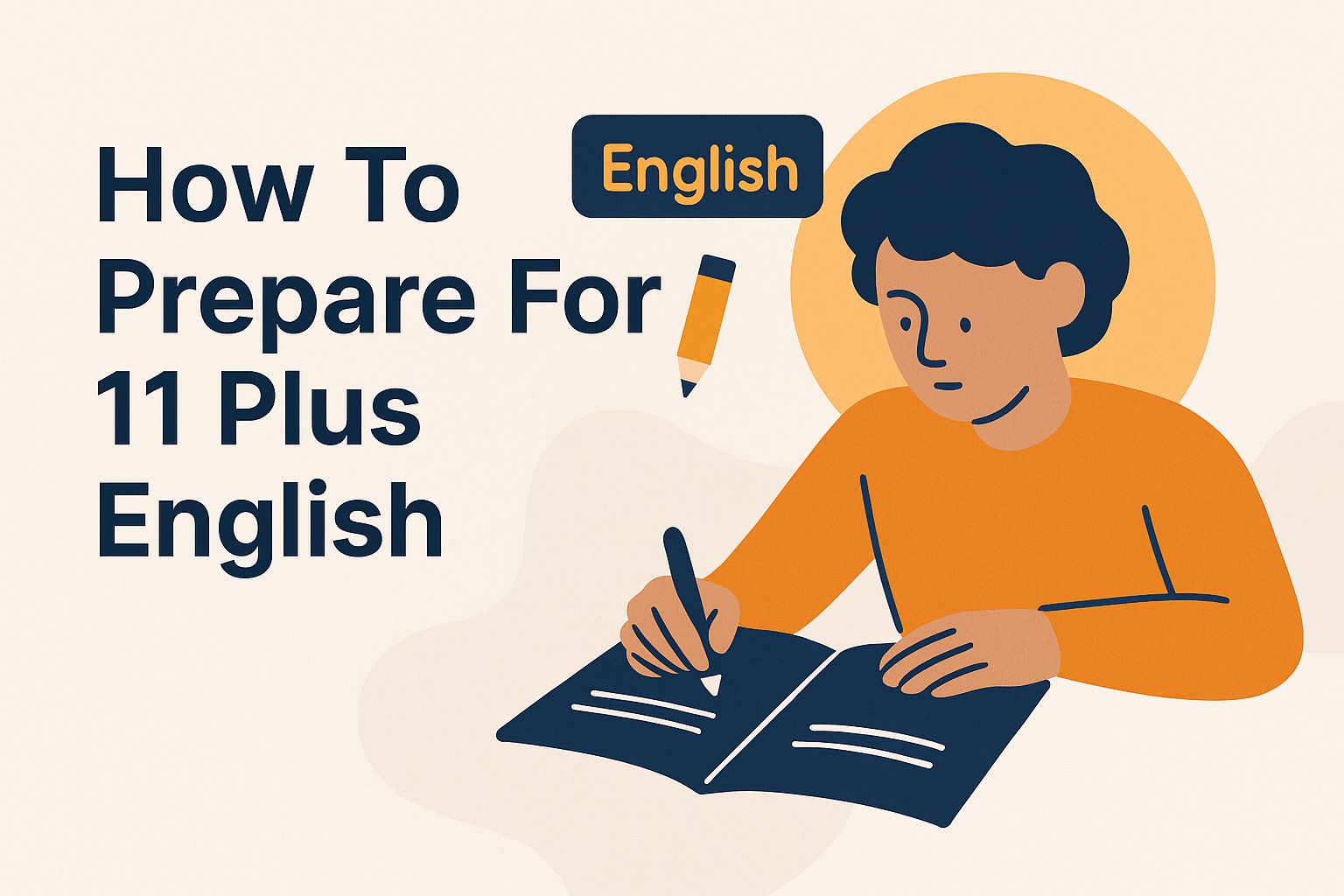
How To Prepare For 11 Plus English
The 11 Plus English exam can feel like a daunting mountain to climb, but it’s also a gateway to exciting educational opportunities. Understanding what to expect and how to prepare can make all the difference.
From deciphering the exam format to honing your reading comprehension and creative writing skills, there’s a lot to tackle. Ready to unlock the secrets to successful preparation? Let’s dive into the essential steps that will set you up for success!
What is the 11 Plus Exam?
The 11 Plus Exam generally consists of multiple-choice questions, with variations in format across different exam boards. This exam assesses students in verbal reasoning, mathematics, and English.
Students can anticipate a variety of question types, which may include comprehension passages, logic puzzles, and mathematical problems.
Each exam board may have its specific areas of focus; for example, the GL Assessment places a strong emphasis on verbal and non-verbal reasoning, while the CEM style incorporates aspects of English grammar and comprehension.
Preparation tools such as Bond Online and 11 Plus Lifeline provide practice papers and interactive exercises designed to align with these exam formats. It is advisable for students to become familiar with specific past papers to effectively adapt to the unique requirements of each board.
Importance of English in the 11 Plus
English constitutes a significant portion of the 11 Plus exam, often accounting for 50% of the total marks, which makes thorough preparation vital for success. To excel in this important section, it is advisable to concentrate on three key strategies.
- First, enhancing your vocabulary through daily reading and flashcards is essential; tools like Anki can significantly aid retention.
- Second, practising comprehension using past papers will help familiarise you with the question formats and the pacing required during the exam.
- Lastly, refining your writing skills by composing essays in response to various prompts is crucial, with a focus on structure and clarity.
Additionally, regularly seeking feedback from teachers or tutors can further strengthen your writing skills, ensuring you achieve the best possible score in this critical subject.
Understanding the Exam Format
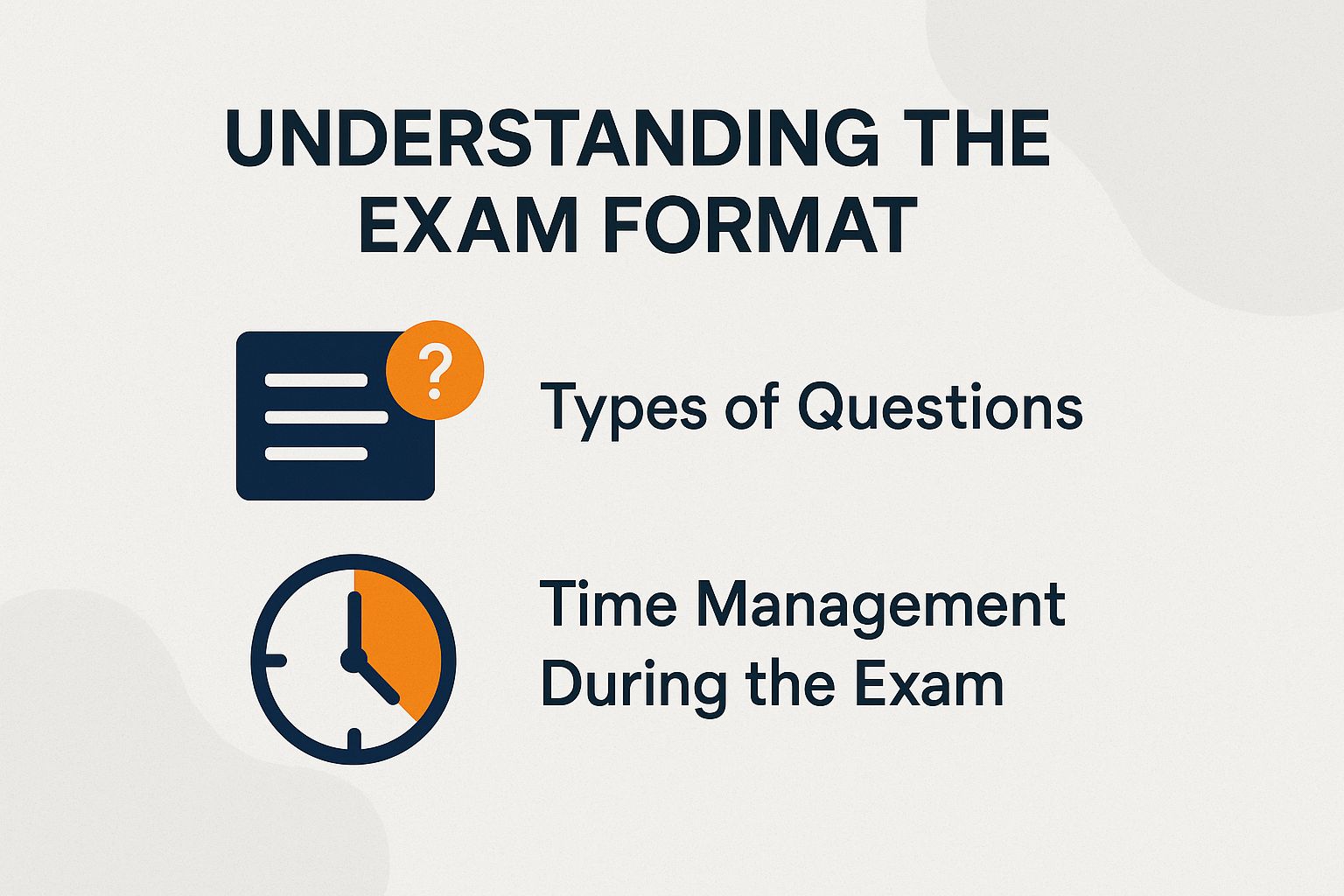
Understanding the format of the 11 Plus English Exam is essential for effective preparation. The exam consists of various types of questions, each with specific timing constraints that candidates must navigate. To gain deeper insights into the structure and expectations, our detailed guide on the format of the 11 Plus Exam provides comprehensive information on the types of questions encountered, including GL, CEM, and ISEB formats.
Familiarising oneself with these elements can greatly enhance readiness for the exam.
Types of Questions
The examination consists of a variety of question types, including comprehension passages, grammar corrections, and vocabulary tasks, all designed to challenge students’ understanding.
Each question type has a specific purpose.
- Comprehension passages evaluate the ability to understand and interpret text, often accompanied by multiple-choice questions that assess critical thinking skills.
- Grammar corrections test one’s knowledge of language rules, requiring candidates to identify and rectify errors within sentences.
- Vocabulary tasks invite students to showcase their grasp of word meanings and their appropriate usage within context.
For effective preparation, it is advisable to utilise practice examinations available on platforms like Khan Academy or Grammarly. These resources offer tailored exercises and provide immediate feedback, which assists candidates in identifying areas that require improvement. As mentioned, understanding the format of the 11 Plus exam can also enhance preparation strategies by familiarising candidates with the test structure.
Time Management During the Exam
Effective time management can significantly influence the outcome of the 11 Plus English Exam, as each section is typically assigned a specific time limit.
To enhance your preparation, consider breaking your study sessions into focused intervals. A useful approach is to study for approximately 30 minutes, followed by a 5-minute break. This method, often referred to as the Pomodoro Technique, is effective in helping to maintain concentration.
It’s also beneficial to practise past papers under timed conditions, aiming to complete each question within the designated timeframe. For instance, if a section consists of 10 questions to be answered in 45 minutes, try to allocate about 4.5 minutes for each question.
After each study session, take the time to review your performance. This will allow you to identify both strengths and weaknesses, providing valuable insights for your future study sessions.
Key Areas of Focus
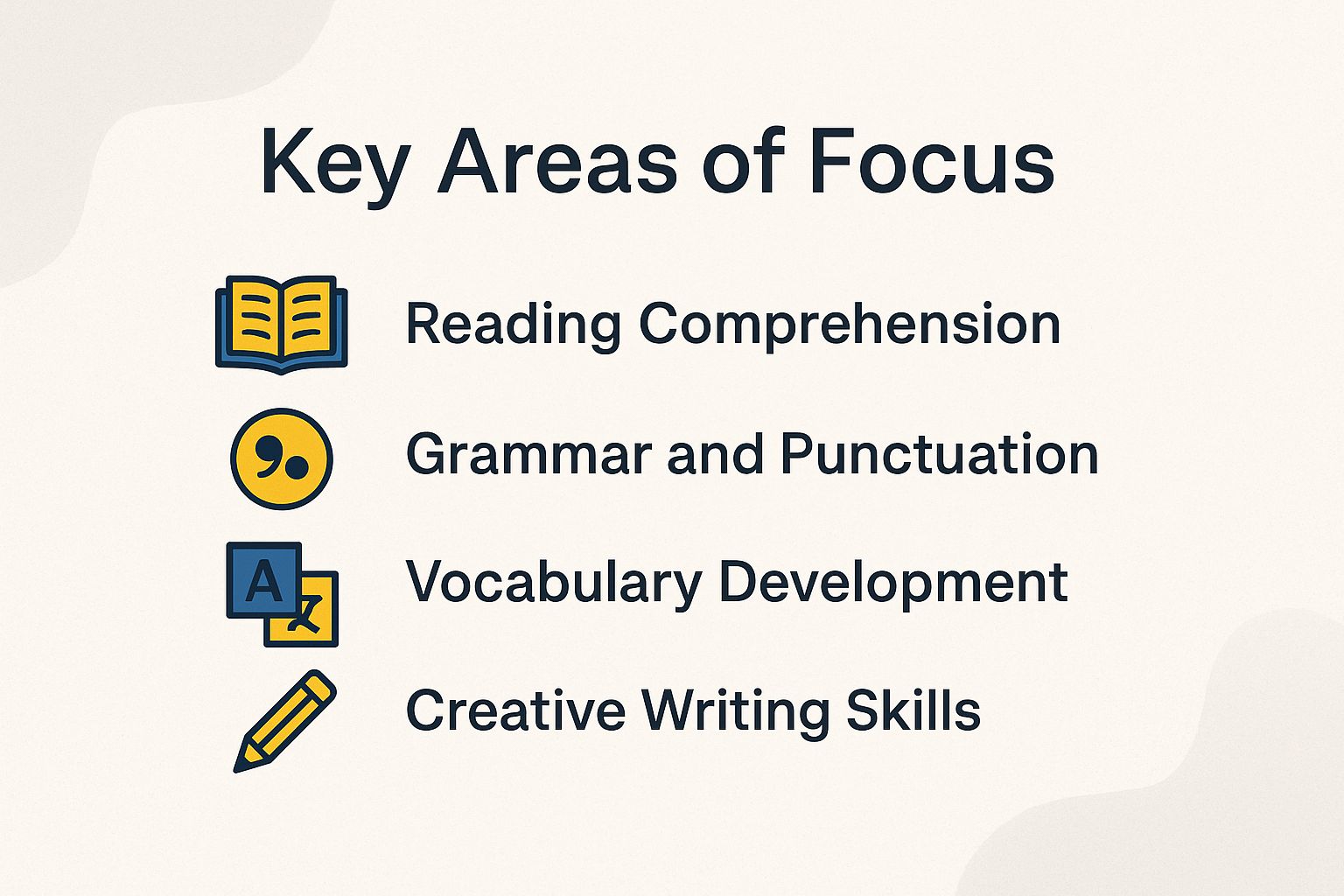
Emphasising key areas such as reading comprehension and grammar rules is crucial for effectively mastering the English component of the 11 Plus Exam. If you’re curious about what subjects are covered in the 11 Plus Exam, this guide offers detailed insights.
Reading Comprehension
Reading comprehension is a vital skill assessed in the 11 Plus examination, requiring students to analyse passages and accurately respond to related questions.
To enhance this skill, it is beneficial to encourage students to engage with a variety of texts, including classic novels, non-fiction articles, and poetry, as these broaden their exposure and understanding.
Introducing active reading strategies can also be quite effective. Techniques such as annotating the text, summarising paragraphs, and asking questions about the content can significantly aid comprehension.
For example, after reading a passage, students could practise summarising it in three sentences to capture the main ideas succinctly.
Additionally, utilising practice materials, such as past 11 Plus papers and comprehension quizzes, can help students become familiar with the types of questions they will encounter. This practice not only improves their response strategies but also builds their confidence for the examination.
Grammar and Punctuation
A solid understanding of grammar and punctuation is crucial, particularly since questions often require students to identify errors and improve sentence structure. To enhance their skills in this area, students should concentrate on mastering a few essential grammar rules:
- Subject-verb agreement
- Correct comma usage
- The distinction between dependent and independent clauses
Resources such as Grammarly can offer real-time feedback on writing, while websites like Purdue OWL provide detailed explanations and exercises. Additionally, practice quizzes available on platforms like Quizlet can be beneficial in reinforcing these concepts.
By regularly reviewing these materials, students will strengthen their understanding and build confidence in spotting common errors.
Vocabulary Development
Expanding one’s vocabulary is essential for the 11 Plus Exam, as many questions are specifically designed to assess word knowledge and usage in context.
To effectively enhance your vocabulary, it is advisable to incorporate flashcards into your study routine. Setting a goal of learning at least 10 new words each week can significantly improve your familiarity with the language.
Additionally, engaging in educational games such as Scrabble or word searches can make the learning process enjoyable and interactive. Regularly reading a variety of materials—such as articles, novels, or magazines—will expose you to new words in context, helping to reinforce their meanings.
It is also beneficial to practise using these words in sentences. This will aid in improving retention and ensure you are well-prepared for the demands of the exam.
Creative Writing Skills
Creative writing skills are evaluated through tasks that require students to craft narratives or argumentative essays, focusing on both structure and creativity.
To enhance these skills, consider implementing specific strategies.
- Start with prompts designed to ignite inspiration—such as writing about a pivotal moment in one’s life or envisioning a world where a common rule is turned on its head.
- Next, it is beneficial to create structured outlines that help organise thoughts and ensure a logical progression in the narratives.
- Engaging in peer review sessions provides not only fresh perspectives but also aids in identifying areas for improvement.
- Utilising tools like Google Docs facilitates collaboration by allowing for real-time feedback and revisions, ultimately enhancing the overall writing process.
Related insight: AI tools can also support the writing process by offering suggestions and grammar checks in real-time, making it easier to refine and polish the final piece.
Study Resources
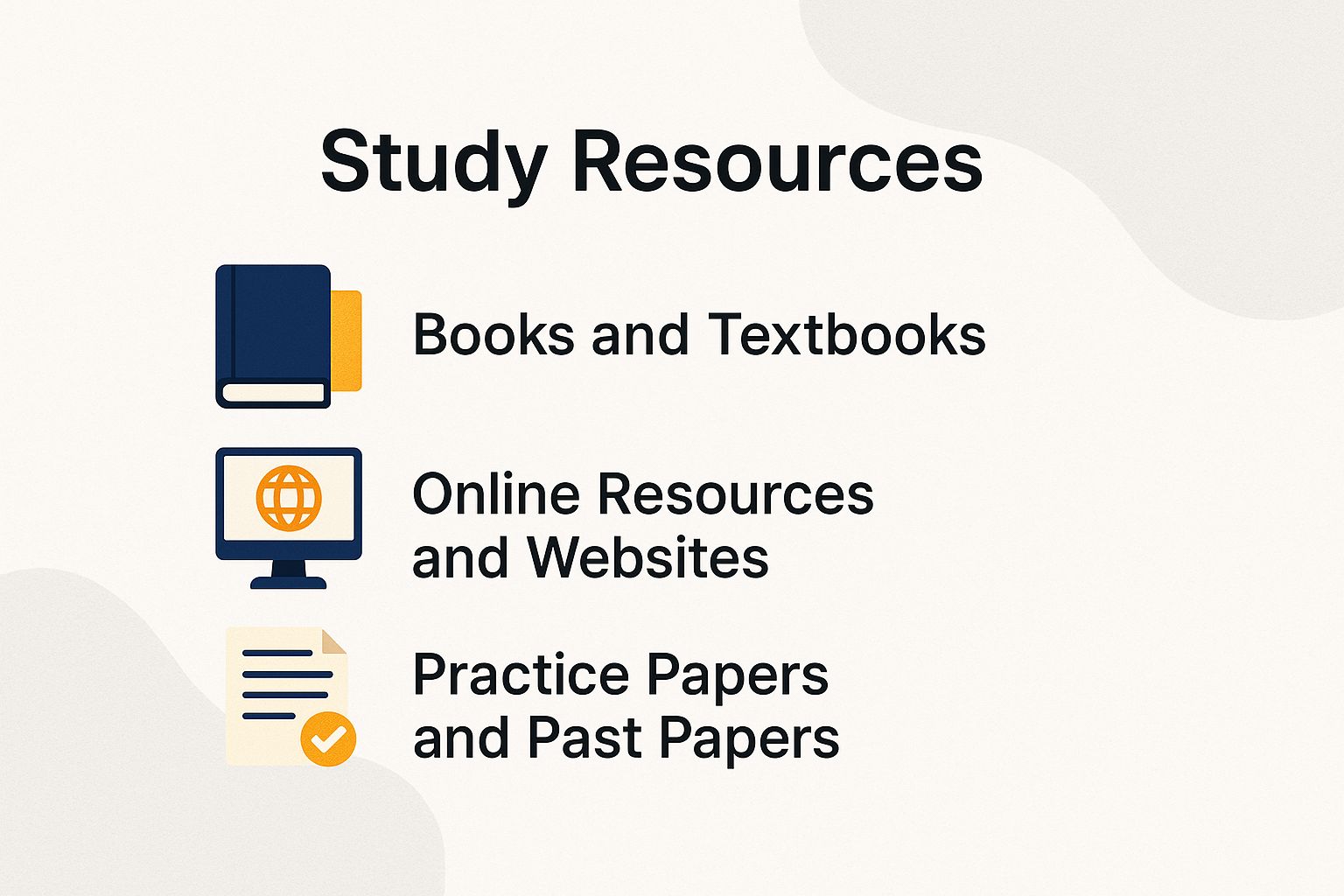
Utilising effective study resources is crucial for successful preparation for the 11 Plus English Exam. This can include a range of materials, from traditional textbooks to various online platforms. Curious about what should be included in an 11 Plus study plan? Our guide offers detailed insights to help you structure your learning approach.
Books and Textbooks
There are several highly regarded books and textbooks available that are specifically designed to comprehensively cover the 11 Plus syllabus.
One notable option is 11 Plus English Mock Papers by CGP, which retails for £9.99. This book offers a variety of question styles and topics that align well with the exam requirements. Another excellent choice is the Bond 11 Plus English Practice Papers, priced at £12.99. This resource is particularly known for its structured approach and extensive practice scenarios.
For those focusing on mathematics, the 11 Plus Maths Practice Papers from Letts, available for £10.50, effectively targets the question formats that students will encounter. These resources are invaluable for targeted preparation, helping students become familiar with both the content and the exam processes involved.
Online Resources and Websites
Online resources provide interactive and engaging content for 11 Plus preparation, featuring websites that offer quizzes, videos, and worksheets. Two particularly noteworthy websites for this purpose are EdPlace and StudyStack.
EdPlace presents tailored worksheets and interactive quizzes that adapt to the learner’s level, ensuring that practice remains both challenging and enjoyable. On the other hand, StudyStack excels in memorisation and revision through its flashcards and games, allowing students to review material in a dynamic way.
Both platforms are user-friendly and promote regular engagement, which is crucial for mastering the 11 Plus material. It is advisable to incorporate these resources into your study schedule, setting aside specific times each week for focused practice.
Practice Papers and Past Papers
Practice and past papers serve as invaluable resources for students to become familiar with the exam format, question types, and timing.
To make the most of these tools, it is beneficial to gather resources from the official exam board’s website, which often offers free past papers. Additionally, platforms like ExamWizard and RevisionWorld provide a combination of free and paid papers designed for various subjects.
To begin your preparation, dedicate specific study sessions to practising these papers under timed conditions. This approach simulates the actual exam environment, which can significantly enhance your confidence.
After completing the papers, take the time to analyse your performance. By identifying your strengths and areas that need improvement, you can focus your study efforts more effectively.
Creating a Study Plan
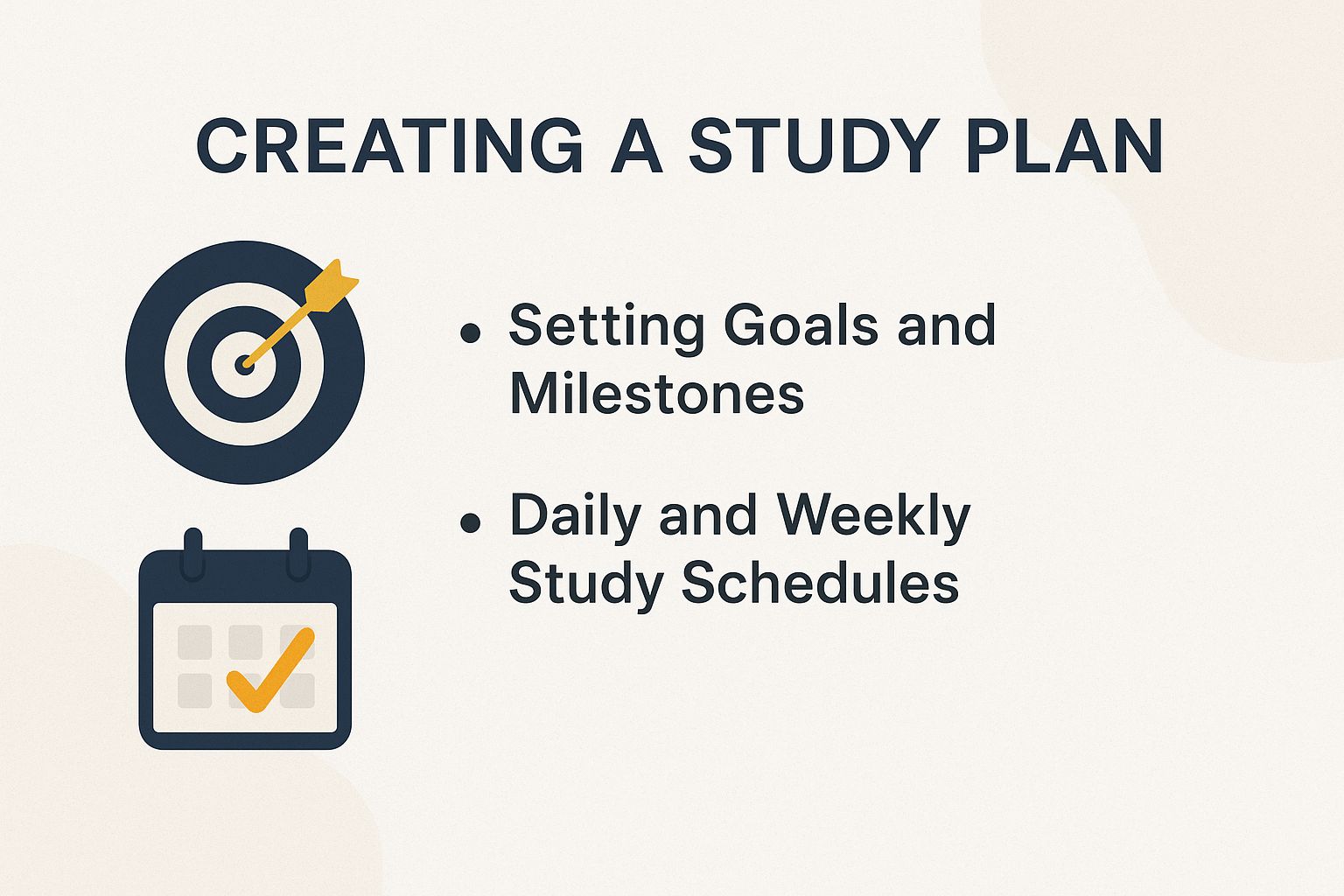
Developing a structured study plan is crucial for effective preparation. It allows you to set measurable goals and timelines for each area of focus, ensuring that you stay organised and on track throughout your studies.
Setting Goals and Milestones
Setting specific, measurable goals and milestones can significantly enhance motivation and help track progress throughout the preparation process. To effectively establish and evaluate your goals, consider utilising the SMART criteria: Specific, Measurable, Achievable, Relevant, and Time-bound.
For instance, rather than simply stating, “I want to get fit,” you might articulate a more precise goal, such as,
I will exercise three times a week for 30 minutes each session for the next three months.”
It is also beneficial to regularly assess your progress at key milestones, such as the end of each month. This allows for necessary adjustments to your tactics. This method not only keeps you focused but also enables you to celebrate small victories, which can significantly boost your motivation along the way.
Daily and Weekly Study Schedules
Creating a balanced daily and weekly study schedule is essential for distributing study time effectively across various subjects and skills.
To start, consider dedicating two-hour blocks to your most challenging subjects, incorporating 30-minute breaks in between to maintain optimal focus. For example, if you study maths from 9 AM to 11 AM, it would be beneficial to take a break until 11:30 AM before transitioning to science.
On a weekly basis, it is advisable to set aside an additional review session every Friday to assess your progress. This allows for adjustments to your study blocks based on which subjects require more attention.
Such a flexible approach not only enhances retention but also aids in managing your workload effectively.
Practice Techniques
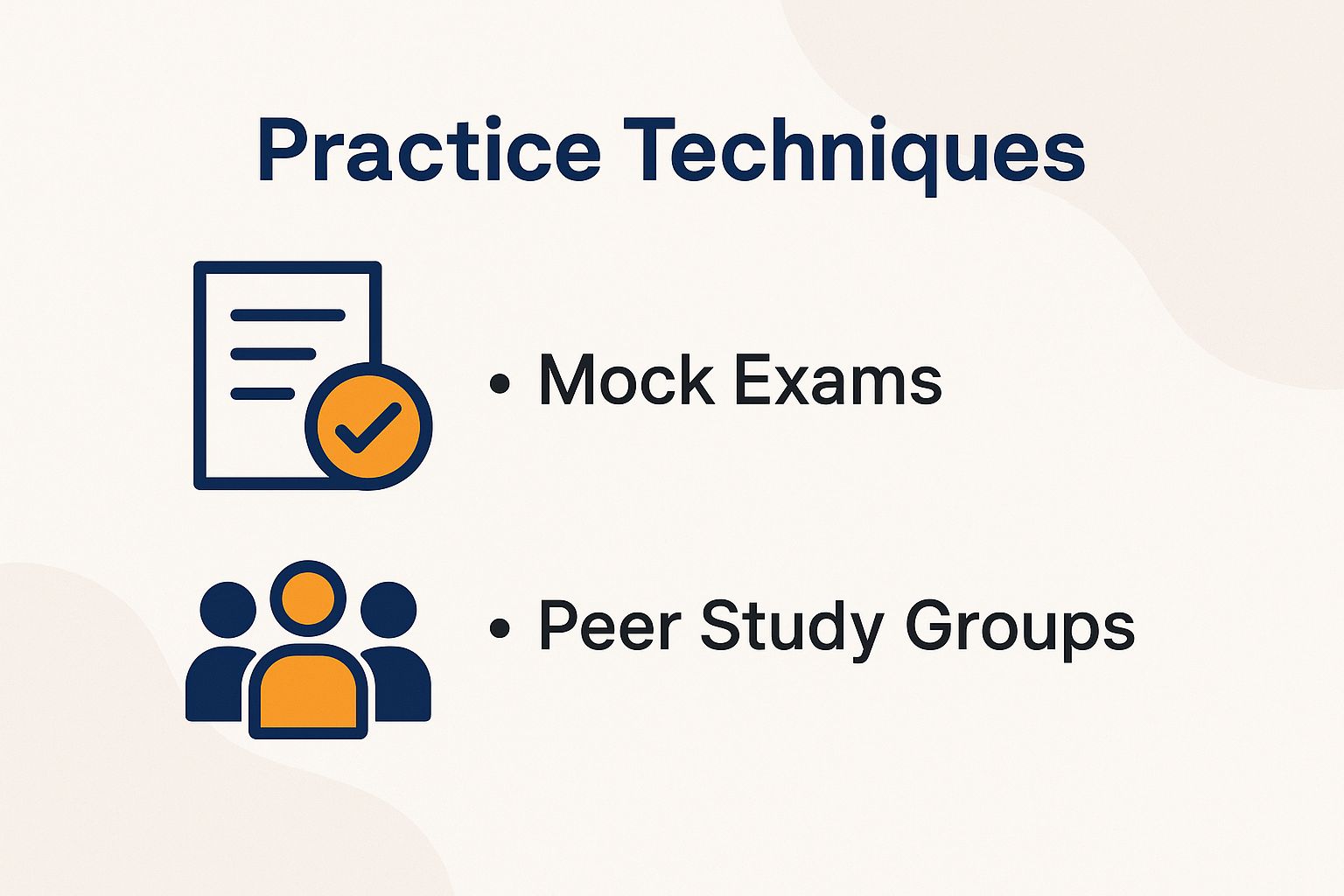
Implementing effective practice techniques, such as mock exams and study groups with peers, can greatly enhance a student’s confidence and preparedness for the examination.
Engaging in these activities provides valuable opportunities for students to assess their understanding and collaborate with others, ultimately leading to a more successful examination experience.
Mock Exams
Mock exams serve as a valuable tool for simulating the pressure of the actual 11 Plus, allowing students to practise time management and develop their skills in handling questions within a test environment.
To conduct effective mock exams, it is essential to replicate the conditions of the real exam. Set a timer that aligns with the actual exam duration, typically ranging from 45 minutes to an hour, and ensure that the setting is quiet and free from distractions.
Utilising past papers or sample questions that are relevant to the 11 Plus can greatly enhance the exam preparation experience. These resources can often be found on educational websites or within exam preparation books.
After completing the exam, it is important to review the answers thoroughly, taking note of strengths and weaknesses.
Creating a feedback sheet that highlights common mistakes is a useful practice, as it allows students to concentrate on these specific areas during their study sessions.
Peer Study Groups
Participating in peer study groups promotes collaborative learning and enables students to share valuable insights and effective strategies.
To create successful study groups, it is important to begin by selecting members who have similar goals or are studying the same subjects. A diverse mix of strengths can be particularly beneficial; for instance, if one member excels in maths while another is skilled in writing, it creates an opportunity for everyone to learn from each other.
It is also essential to establish clear objectives for each meeting, such as reviewing a specific chapter or preparing for an upcoming exam. Structuring the sessions with a focused agenda will help, allowing time for discussion, practice problems, and constructive feedback.
Regularly assessing the group’s progress is crucial to ensure that everyone is gaining value from the experience, and it allows for adjustments to strategies as needed.
Tips for Effective Preparation
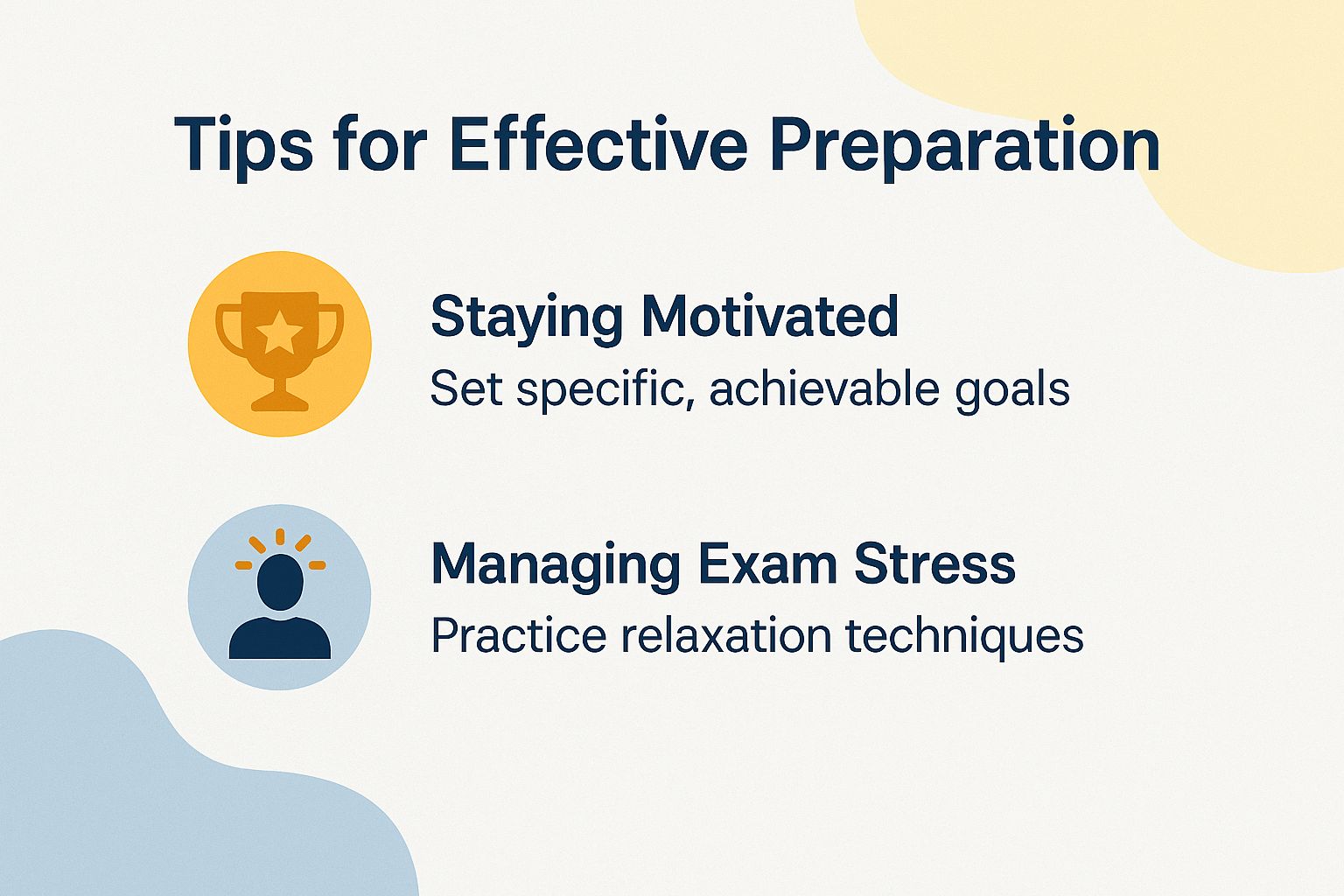
Implementing effective preparation strategies can significantly enhance a student’s readiness and confidence for the 11 Plus Examination.
Staying Motivated
Maintaining motivation is essential during the preparation process, and setting small, achievable milestones can effectively help sustain momentum.
To enhance motivation, you might consider implementing a reward system. For example, after reaching a milestone, treating yourself to something enjoyable—such as a favourite snack or a brief break to watch a video—can be quite rewarding.
Using visual progress trackers, like a chart or an app, can also prove beneficial; seeing your advancement laid out visually can significantly boost your enthusiasm.
It’s helpful to establish short-term goals, such as completing a specific task each week. This strategy not only breaks down larger objectives into manageable parts but also allows for frequent accomplishments that can keep your drive alive.
Managing Exam Stress
Managing exam stress is crucial for achieving optimal performance, and incorporating relaxation techniques can greatly alleviate anxiety. To effectively address stress, it may be beneficial to practise mindfulness exercises, such as dedicating a few minutes each day to focus on your breath.
One effective method is the 4-7-8 breathing technique: inhale for 4 seconds, hold your breath for 7 seconds, and then exhale for 8 seconds.
Visualisation can also serve as a helpful tool; taking a moment to picture a peaceful scene before studying or during breaks can create a calming effect.
By combining these strategies, you can cultivate a calmer mind, which will enhance your ability to concentrate on your studies and ultimately improve your overall performance in exams.
Frequently Asked Questions
1. What is the 11 Plus English exam?
The 11 Plus English exam is an entrance exam taken by students in the UK in their last year of primary school, generally aged 10-11. It is used as a way to select students for grammar or independent schools.
2. How can I start preparing for the 11 Plus English exam?
The best way to start preparing for the 11 Plus English exam is to familiarise yourself with the content and format of the exam. This includes practising comprehension, vocabulary, grammar, and creative writing skills. You can find practice materials online or through study guides.
3. How much time should I dedicate to preparing for the 11 Plus English exam?
The amount of time you should dedicate to preparing for the 11 Plus English exam depends on your current level and how much you feel you need to improve. However, it is recommended to start preparing at least 6 months in advance and dedicate 1-2 hours of studying per day.
4. What are some effective study strategies for the 11 Plus English exam?
Some effective study strategies for the 11 Plus English exam include creating a study schedule, practising regularly, and focusing on your weakest areas. It can also be helpful to work with a tutor or study in a group to gain valuable feedback and support.
5. Are there any specific tips for the creative writing section of the 11 Plus English exam?
For the creative writing section of the 11 Plus English exam, it is important to plan out your ideas before you start writing. Focus on creating a clear structure, using descriptive language, and including a variety of sentence lengths and punctuation. It can also be helpful to read and analyse sample creative writing pieces.
6. What should I do on the day of the 11 Plus English exam?
On the day of the 11 Plus English exam, make sure to get a good night’s sleep and eat a healthy breakfast. Bring all necessary materials, such as pencils and calculators, and arrive early to the exam location. Take deep breaths and stay calm and focused during the exam.


